GALATASARAY LEGEND GHEORGHE HAGİ
Gheorghe Hagi
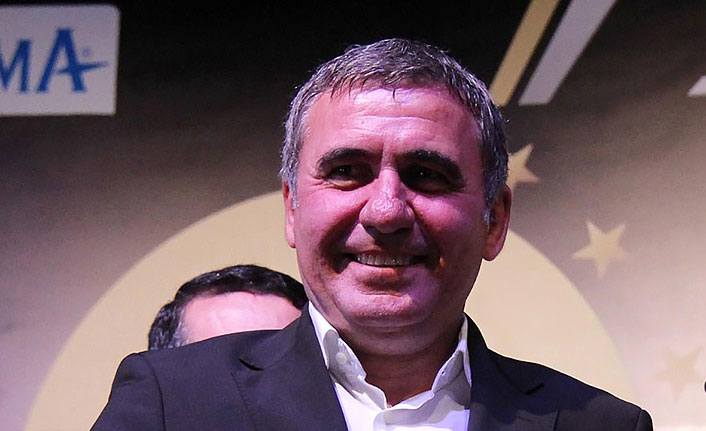
Gheorghe Hagi (Romanian pronunciation: born 5 February 1965) is a Romanian professional football manager and former player. Currently, he serves as the owner and manager of Liga I club Farul Constanța. Hagi, deployed as an attacking midfielder, was considered one of the best players in the world during the 1980s and '90s, and is widely regarded as the greatest Romanian footballer of all time. Fans of the Turkish club Galatasaray, where Hagi concluded his career, affectionately called him Comandante while Romanian supporters knew him as. Nicknamed "The Maradona of the Carpathians," he was a creative advanced playmaker renowned for his dribbling, technique, vision, passing, and shooting.
After commencing his playing career in Romania with Farul Constanța and subsequently featuring for Sportul Studențesc and Steaua București, Gheorghe Hagi later embarked on spells in various countries. He had stints in Spain with Real Madrid and FC Barcelona, in Italy with Brescia, and in Turkey with Galatasaray. Remarkably, Hagi is one of the few footballers to have played for both Spanish rival clubs, Real Madrid and Barcelona.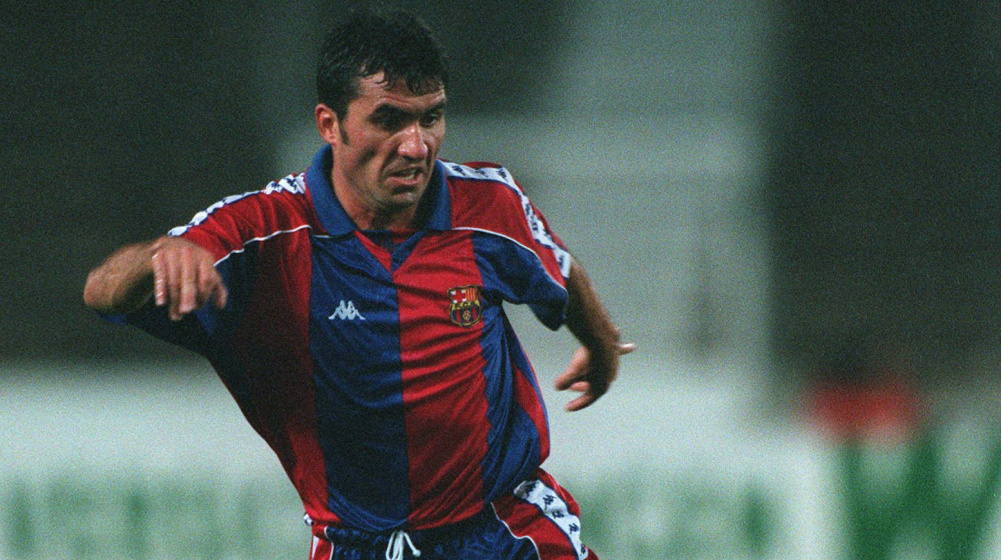
Throughout his illustrious club career, he amassed numerous titles in four different countries. Hagi secured three Romanian League titles, two Cupa României titles, and the European Super Cup with Steaua București. He also reached the final of the 1988–89 European Cup with the same team. Additionally, his achievements include a Supercopa de España title with Real Madrid, the Anglo-Italian Cup with Brescia, another Supercopa de España title with Barcelona, and four Süper Lig titles, two Turkish Cups, two Turkish Super Cups, the UEFA Cup, and the UEFA Super Cup with Galatasaray.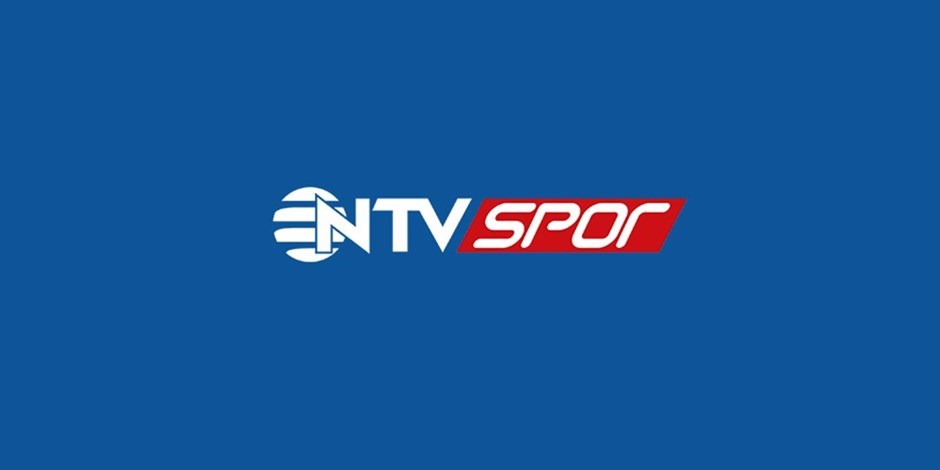
At the international level, Hagi represented the Romania national team in three FIFA World Cups—1990, 1994 (earning a spot in the World Cup All-Star Team for his contributions to Romania's quarter-final appearance), and 1998. Additionally, he participated in three UEFA European Championships—1984, 1996, and 2000. His international career spanned from 1983 to 2000, during which he earned a total of 124 caps for Romania, making him the second-most capped Romanian player of all time, surpassed only by Dorinel Munteanu. Furthermore, Hagi shares the title of joint all-time leading goalscorer for the Romania national side (alongside Adrian Mutu), having scored a total of 35 goals.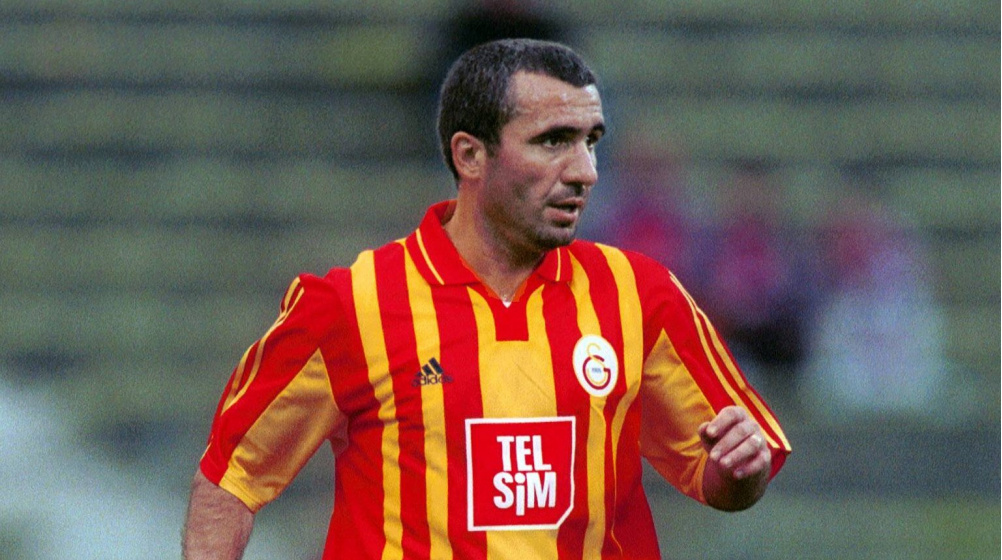
Hagi is revered as a hero both in his homeland and in Turkey. He clinched the title of Romanian Footballer of the Year a remarkable seven times, solidifying his status as one of the premier football players of his generation.His prowess on the field earned him six nominations for the Ballon d'Or, with his best performance securing a 4th place finish in 1994. As a testament to his enduring impact, in November 2003, Hagi was honored as the Golden Player of Romania by the Romanian Football Federation during UEFA's Jubilee, recognizing him as the most outstanding player in the country over the past 50 years.
Furthermore, in 2004, Pelé named Hagi as one of the 125 Greatest Living Footballers during a FIFA Awards CeremonyWorld Soccer Magazine also acknowledged his brilliance by ranking him at number 25 in their list of the 100 greatest players of the 20th century in 1999.
After retiring from professional play in 2001, Hagi transitioned to a managerial career, taking charge of various teams in Romania and Turkey. He served as the coach for the Romania national team and managed clubs such as Bursaspor, Galatasaray, Politehnica Timișoara, Steaua București, Viitorul Constanța, and Farul Constanța. Notably, in 2009, he played a pivotal role in the establishment of the Romanian club Viitorul Constanța, which he personally coached from 2014 to 2020. Hagi's commitment to football development extended beyond coaching; he founded a football academy bearing his name, recognized as one of the largest in Southeastern Europe.
Early life
Hagi was born to Chirata Hagi, his mother, and Iancu Hagi, his father.His grandfather was among the 40,000 ethnic Aromanians who sought refuge in Romania after fleeing Greece. They settled in the village of Săcele, near Constanța on the Black Sea coast. Hagi cherishes fond memories of his grandfather, a shepherd like many Aromanians. Reflecting on his time spent with his grandfather, Hagi shared, “I was proud when he, who was called Gheorghe like me, asked me to go and spend the whole day with him minding the sheep. I loved to eat cheese and tomatoes with him, and that is still my favorite food today.Additionally, he emphasized that ambition is the main quality of the Aromanians.
Hagi initiated his football journey playing for the youth teams of FC Constanța in the 1970s under the guidance of coach Iosif Bükössy.In 1980, the Romanian Football Federation selected him to join the squad of Luceafărul București, where he spent two years.Returning to FC Constanța in 1982, Hagi made his Divizia A debut under coach Emanoil Hașoti in a match against SC Bacău, which ended in a 3–0 loss. At the age of 18, he was ready to take the leap and play for a top-tier team.Initially directed towards Universitatea Craiova, Hagi ultimately chose to join Sportul Studențesc of Bucharest instead.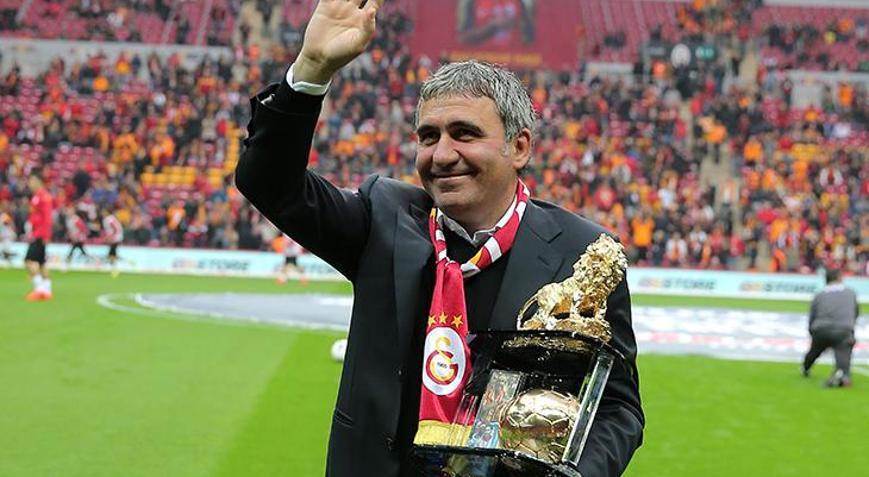
Following an impressive showing at the 1990 FIFA World Cup, Hagi secured a move to the Spanish club Real Madrid on 27 June of the same year. Real Madrid paid Steaua București $3.5 million for his transfer to La Liga.Hagi spent two seasons with Real Madrid, facing challenges in achieving significant success. During this period, he scored 20 goals in 84 games and secured the Supercopa de España title. 
Hagi commenced the 1992–93 season with Brescia in Serie A. However, after his first season, the club faced relegation to Serie B.In the subsequent season, Hagi played a crucial role in Brescia's victory in the Anglo-Italian Cup, securing a 1–0 win over Notts County in the final at Wembley. Additionally, he contributed to the team's third-place finish in Serie B, leading to promotion back to Serie A.Following a standout performance in the 1994 World Cup, Hagi returned to Spain and was signed by the defending La Liga champions Barcelona for 2 million. In his initial stint with the club, he quickly secured his second Supercopa de España title. However, he encountered challenges in gaining playing time under manager Johan Cruyff. Despite this, Hagi managed to contribute by scoring 3 goals in 5 matches when Barcelona reached the semi-finals in the 1995–96 UEFA Cup season.
In 2004, while serving as the coach for Galatasaray, Hagi briefly emerged from retirement to play in the testimonial game for his former teammate Suat Kaya against Turkey XI. During the match, Hagi played the first half donning his iconic shirt number 10 and contributed to Galatasaray's 2–1 victory.
Gheorghe Hagi marked his debut for Romania on 10 August 1983 at the youthful age of 18, under the guidance of coach Mircea Lucescu. Lucescu utilized him for the entire duration of a friendly match against Norway, which concluded in a 0–0 draw at the Ullevaal Stadium in Oslo.Hagi secured his first international goal against Northern Ireland in 1984.In the subsequent year, he was bestowed with the captain's armband for the first time, leading the team in a World Cup qualifier against the same opponent.
Despite Romania's failure to qualify for the 1986 World Cup,[8] Hagi later played a pivotal role in the 1990 World Cup. His contributions helped the team advance to the round of 16, where their journey ended at the hands of the Republic of Ireland. After a 0–0 draw, Ireland won the resulting penalty shoot-out, with Hagi successfully converting Romania's first spot kick.Four years later, Hagi captained the Romanian team to its best-ever international performance at the 1994 World Cup, reaching the quarter-finals before succumbing to Sweden in another penalty shoot-out.Hagi showcased his skill by scoring three times in the tournament, including a memorable goal in their 3–2 surprise victory over South American powerhouse and previous runners-up Argentina.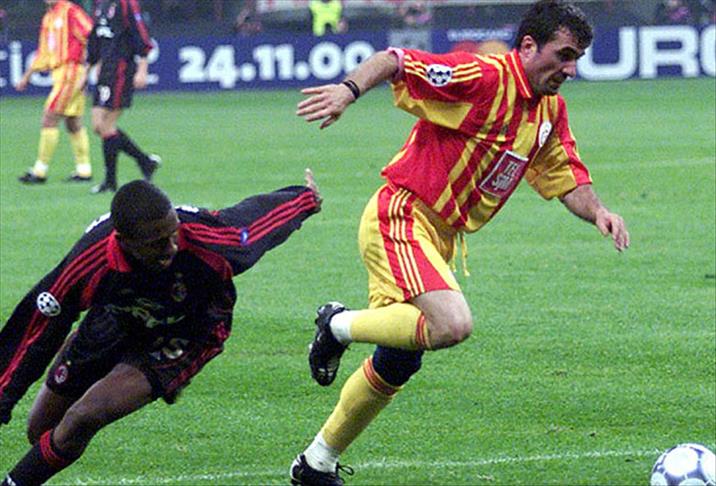
In the subsequent four years, Hagi served as the captain of the Romanian national team during the 1998 World Cup. Initially declaring that France '98 would mark his final tournament, Romania performed admirably, topping their group that included England, Colombia, and Tunisia. The team advanced to the round of 16 but faced elimination at the hands of Croatia.Following the tournament, Hagi initially retired from the national team. However, after a change of heart a few months later, he decided to participate in UEFA Euro 2000. Unfortunately, his international career concluded with a red card in the quarter-final match, where Romania suffered a 2–0 loss to eventual runners-up Italy. This match served as Hagi's final appearance on the international stage.
Hagi concluded his professional football career in 2001, deciding to retire at the age of 36. To commemorate his remarkable career, a testimonial game titled "Gala Hagi" was organized on 24 April of that year. The match featured a team of Romanian All-Stars facing off against a team of international All-Stars.At the time of his retirement, Hagi held the record for the most caps for his country, with 124 appearances, although this record has since been surpassed by Dorinel Munteanu. Notably, he still retains the record for the most goals scored for the Romania national team, sharing the honor with Adrian Mutu, each having scored 35 goals.
Romania national team
In 2001, Hagi assumed the role of manager for the Romania national team, taking over from Ladislau Bölöni, who had departed to coach Sporting Clube de Portugal. Unfortunately, Hagi's tenure proved short-lived as the team failed to qualify for the World Cup, leading to his dismissal. Despite the challenges, his noteworthy accomplishment during the six months as Romania's manager was a significant victory in Budapest against Hungary.
Bursaspor
In 2003, Hagi assumed the coaching role at Turkish Süper Lig side Bursaspor; however, he departed from the club due to a disappointing start to the season.
Galatasaray
Hagi assumed the managerial position at Galatasaray in 2004, guiding the team to the Turkish Cup final in 2005 with a convincing 5–1 victory against fierce rivals Fenerbahçe. However, his contract was not renewed as his team fell short of winning the 2004–05 Süper Lig title against Fenerbahçe during the centennial celebration of the club.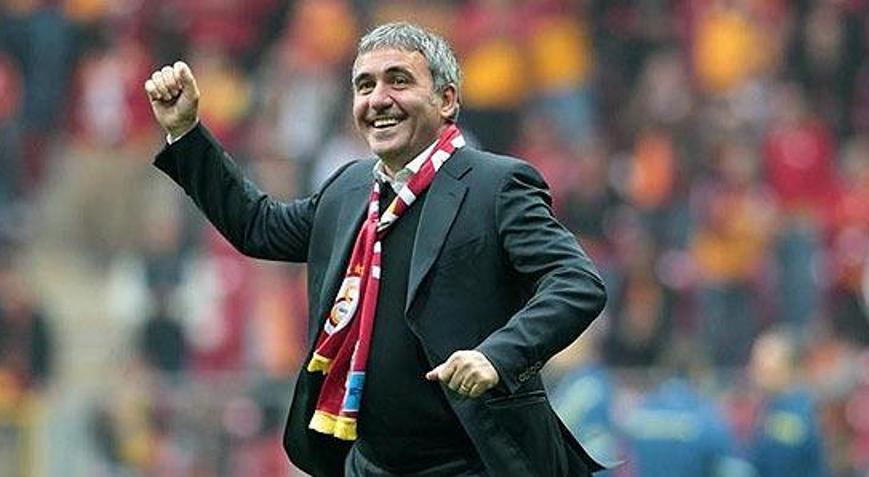
References
- "Gheorghe Hagi". Turkish Football Federation. Retrieved 21 December 2020.
- ^ Jump up to:
- a b "Gheorghe Hagi – Century of International Appearances". RSSSF. Retrieved 17 July 2012.
- ^ Jump up to:
- a b c d "Gheorghe Hagi". Planet World Cup.com.
- ^ "Famous Romanians: Gheorghe Hagi" Archived 24 September 2015 at the Wayback Machine. Romania Insider. 11 August 2010.
- ^ "Gheorghe Hagi". FC Barcelona. Retrieved 19 March 2020.
- ^ Jump up to:
- a b c d e f g h i j k l m n o p q r s t u v w "Romania and Gala's commander and king". FIFA. 17 August 2013. Archived from the original on 5 November 2019. Retrieved 18 November 2013.
- ^ "Gheorghe HAGI". FIFA.com. Archived from the original on 12 March 2014. Retrieved 3 October 2017.
- ^ Jump up to:
- a b c d e f g h i j k l "Gheorghe Hagi: The Maradona of the Carpathians". ESPN FC. 21 May 2010. Retrieved 10 September 2015.
- ^ "Hagi, pe locul 35 în topul celor mai buni fotbaliști ai secolului" (in Romanian). 7 November 2007.
- ^ Jump up to:
- a b c "World Soccer 100 Players of the Century". England Football Online.
- ^ Jump up to:
- a b Pierrend, José Luis (1 February 2006). "European Footballer of the Year ("Ballon d'Or") 1994". RSSSF. Retrieved 15 December 2020.
- ^ "Golden Players take centre stage". UEFA.com. 29 November 2003. Archived from the original on 12 March 2004. Retrieved 4 May 2009.
- ^ "Pele's list of the greatest". BBC Sport. 4 March 2004. Retrieved 18 November 2013.
- ^ "Suma fabuloasă pe care Gică Hagi a investit-o în Academie şi facilităţile incredibile din complex" (in Romanian). Gazeta Sporturilor. 10 July 2015. Retrieved 11 July 2015.
- ^ "A decedat si mama lui Gica Hagi". Ziarul de Iași (in Romanian). 27 February 1999.
- ^ "Why Gheorghe Hagi is a footballing icon". fourfourtwo.com. 24 July 2017. Retrieved 20 March 2022.
- ^ "SportMob – Top facts about Gheorghe Hagi, Maradona of the Carpathians". SportMob. 14 October 2021. Retrieved 20 March 2022.
- ^ "Gheorghe Hagi: Maradona of the Carpathians". Football Makes History. 15 August 2020. Retrieved 20 March 2022.



































